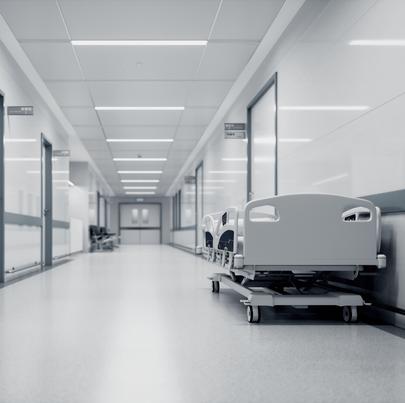It is hard to accurately tell how many people die due to medical malpractice in hospitals in Chicago and across the United States. The reason for this is that hospitals and medical practitioners are less likely to report deaths arising from their mistakes. Another reason is that an actual count of how many people die in hospitals because of preventable medical errors has never happened.

Fortunately, however, several studies provide estimates of hospital deaths directly caused by preventable medical errors. A 2016 study estimates more than 250,000 deaths per year, while 2013 one offers a range of 210,000 to 400,000 fatalities annually. Another study conducted as early as 1999 places this figure at 98,000 per year.
How Many Hospital Deaths Are Caused By Medical Malpractice?
A 2016 study by Johns Hopkins University School of Medicine researchers found that medical malpractice caused over 250,000 hospital deaths in the United States. This figure represents around 9.5% of total annual deaths in the nation. The figure is also higher than fatalities caused by respiratory diseases, Alzheimer’s, stroke, or accidents.
The study arrived at this figure by analyzing medical death rate data for eight years. It included patients whose death was directly attributable to substandard medical care. It did not include those who died from illnesses or health issues despite receiving quality medical care. Those who died from diseases with no treatment options were also left out.
These findings reflect a 2013 study that found that up to 400,000 patients seeking medical attention at hospitals die every year due to preventable adverse events. John T. James of Texas-based NASA Space Center conducted the 2013 study. He reviewed the medical records of more than 4,200 patients from 2002 to 2008.
James found that 21% of patients included in the study had obtained some form of poor-quality medical care, resulting in 1.4% of deadly events. He used this data to estimate the number of deaths for 34 million hospitalizations in 2007.
His findings suggested that preventable medical errors caused 210,000 to 400,000 deaths annually. These figures are within the range of the 2016 Johns Hopkins study that attributed over 250,000 deaths to medical errors.
Besides the two studies, a 1999 study noted that preventable medical mistakes were growing into an epidemic in the U.S. The study found that medical errors caused up to 98,000 fatalities annually.
Actual numbers of deaths in hospitals caused by medical malpractice are still unknown because some cases go unreported. Also, responsible authorities have never counted how many people die in hospitals because of medical malpractice.
Estimates by different studies, however, suggest that medical error-related deaths are an epidemic in the U.S. Hundreds of thousands of people die due to avoidable errors in hospitals and other medical facilities throughout the nation. The number of those suffering from long-term injuries caused by substandard medical treatment is higher.
Hospital Errors Are The Third Leading Cause Of Death In The United States
The Johns Hopkins researchers found that hospital errors are the third leading cause of death in the U.S. Heart disease and cancer occupy the first and second positions, respectively. According to the Centers for Disease Control and Prevention (CDC), however, respiratory diseases hold the third position in the ranking of leading causes of death in the U.S.
The researchers attribute the difference between their findings and the CDC figures to the agency’s data collection methods that fail to include a separate category for hospital errors on the death certificate.
Martin Makary, the study’s lead researcher, said that official national data collection methods have failed to recognize incidence rates for fatalities caused by medical errors. He added that the medical coding system was specifically tailored for healthcare services billing, not for gathering national health data, as is the case today.
Makary emphasized the importance of accurate data in informing research and funding decisions. He pointed out that the CDC’s report on the leading causes of death informs the U.S. government’s research and health funding priorities. As such, too much focus goes toward cancer and heart disease. He concluded that medical errors do not get adequate focus and funding because they are not included in the ranking.
The Johns Hopkins team made several recommendations to help minimize deaths caused by hospital errors. It recommended reporting errors immediately after they happen to ensure timely interventions are made before affected patients suffer irreversible consequences. It also advised healthcare professionals to follow procedures that account for human limitations.
The team advises hospitals to investigate all medical error-related deaths in their facilities to identify possible causes of those errors. The team believes that effective scientific methods that start with problem assessment are instrumental in dealing with any health risk to patients.
Why Are People Dying in Hospitals in Chicago?
Preventable hospital errors are one of the leading causes of death in hospitals in Chicago and the U.S. Deaths in Chicago hospitals can happen due to the following reasons:
Communication Breakdowns
Communication problems can result in fatal medical errors. These problems can arise at any point during the transfer of information between a patient and a healthcare practitioner. They can also happen during the transfer of information between the numerous parties involved in patient care and treatment.
Poor Information Flow
Poor information flow occurs when essential information fails to follow a patient when the patient moves from one section to another or transfers to another hospital. This problem can result in wrong or incomplete prescriptions due to inadequate information on the patient’s records. It can also lead to miscommunication of test results. All these scenarios can cause preventable deaths in hospitals.
Human Problems
Human problems constitute a failure to meet the applicable medical standard of care or comply with established policies or protocols. Incorrect documentation of patient information and poor labeling of samples are some examples of human problems.
Human problems can arise due to negligence or recklessness. These two types of torts will impact the compensation you might recover in a medical malpractice claim differently. So, knowing the difference between negligence and recklessness is crucial. This is especially true if you intend to hold a hospital or medical professional liable for your medical malpractice injuries or loss of a loved one.
Diagnostic Errors
Diagnostic errors constitute a failure to make a correct and timely diagnosis. A doctor might miss a diagnosis entirely, make an incorrect diagnosis, or take unnecessarily long to make an accurate diagnosis. The outcome is injury, health complications, or even death of the involved patient.
Doctors usually make diagnostic mistakes when they fail to work closely with patients and listen to them carefully. They also make these errors when they do not carefully examine test results and records.
Hospital-Acquired Infections (HAIs)
Patients expect to leave hospitals feeling much better than they entered. Unfortunately, some patients develop infections within healthcare environments, such as hospitals, medical centers, or nursing homes. In fact, CDC reports that acute care centers across the U.S. recorded 687,000 HAIs and 72,000 deaths in 2015.
Many HAIs occur because of poor sanitary protocols, staff shortfall, taking shortcuts, and ignoring sterilization procedures. Patients can suffer serious health consequences and even lose their lives because of these infections.
You might have a valid medical malpractice claim if you or a loved contracted an infection in a healthcare setting. Your personal injury lawyer will investigate your case to determine if your infection is hospital-acquired. If so, the lawyer will help you navigate all the steps of holding the hospital liable for its negligent actions.
Prescription Medication Errors
In the past, medication errors stemmed from physicians’ poor handwriting or the inability of pharmacists to decode correct prescription drug and dosage information from handwritten prescriptions. Today, physicians use computer programs to create prescriptions and dispatch them to pharmacists within or outside the facility.
The shift from handwritten to electronic prescriptions has been helpful but has not eliminated medication errors. Doctors and their assistants sometimes transcribe the wrong letters or numbers. Other times, they enter incorrect information.
Medication errors can happen when doctors prescribe an incorrect drug dosage to a patient. They can also occur when a doctor fails to obtain a comprehensive patient history or carefully review a patient’s history before prescribing medications.
Surgical Errors
The latest medical technology has made surgeries less risky. Despite that, surgeons still make mistakes. They may leave surgical tools inside the patient’s body.
Some surgeons operate on the wrong patient due to failure to crosscheck the patient’s identity before the procedure. Others operate on the wrong body part or perform an incorrect surgical procedure on the right body part.
Carrying out unnecessary surgeries when other less risky and effective treatment options are available also qualifies as a surgical error. This error often occurs when medical professionals fail to keep up with research in their fields.
Surgical errors are usually severe and can be fatal sometimes. The reason is that the affected patient may take a while before getting any symptoms. The outcome is that the patient may suffer serious injuries or health complications from the error before it is detected and rectified. Additional surgical procedures are usually necessary to correct the surgical error.
Faulty Medical Equipment and Devices
People may also die in hospitals in Chicago when medical equipment or devices malfunction. Product manufacturers are often responsible for injuries or deaths caused by defective medical equipment or devices. Physicians and other medical practitioners may also be liable when patients sustain injuries or get killed due to medical equipment or device failure.
A medical practitioner, for instance, may be liable for injuries or deaths caused by old or poorly maintained equipment like ventilators and heart monitors. The same consideration applies to old or poorly maintained medical devices like prosthetics, implants, and pacemakers.
Failure to Treat
This medical malpractice happens when a doctor diagnoses a patient correctly but does not provide the appropriate treatment. It can also occur when a doctor is in charge of too many patients or fails to provide reasonable follow-up care. You could file a medical malpractice claim if you were injured or developed a serious health complication because your doctor:
- Discharged you too early
- Did not refer you to another medical practitioner or facility for specialized treatment
- Did not provide adequate follow-up care and treatment
Birth Injuries
Birth injuries can happen due to medical errors at any stage of the pregnancy, labor, or birth. Substandard prenatal care, for instance, can lead to fatal birth injuries. Incorrect drug administration to pregnant women, use of unsterilized birth tools, and poor timing when cutting the umbilical cord are other situations that can cause life-threatening birth injuries.
Pursuing Compensation for Injuries or Deaths Caused by Medical Errors
Medical professionals take an oath to protect patients from any harm during treatment. The law also requires them to meet a specific standard of care when treating and handling patients. Departing from the acceptable standard of medical care and safety can harm patients and subject them to immense suffering.
Failure to uphold a professional duty of care and harming patients amounts to medical malpractice. You are entitled to compensation for damages or losses arising from injuries caused by the negligent actions of your medical provider.
You also have a right to pursue compensation if you lost a loved one due to actions (or inactions) of a physician or another healthcare practitioner. In this case, a wrongful death lawyer with high success rates in handling cases like yours can help you build a strong case against the liable doctor and persistently fight for reasonable compensation.
Your lawyer, for instance, can help you make an autopsy request and gather other relevant pieces of evidence required to prove that your loved one died because of a preventable medical error. An autopsy report may detect a treatable illness that medical professionals failed to diagnose and treat. Such evidence can be crucial in demonstrating that medical negligence might have contributed to your loved one’s death.






